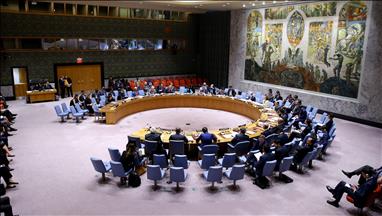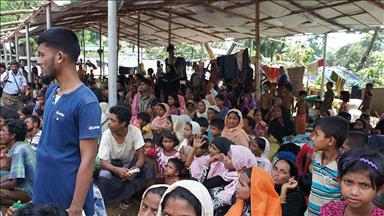Rohingya Muslims struggle to survive in Bangladesh camp
Refugees take shelter on roadsides and in rice fields in Bangladesh to escape persecution in Myanmar
 COX'S BAZAR, BANGLADESH - SEPTEMBER 07: Rohingya Muslim women, fled from ongoing military operations in Myanmar’s Rakhine state, line up at a refugee camp 50 kilometers south of Cox's Bazar, Bangladesh on September 07, 2017. Violence erupted in Myanmar’s Rakhine state on Aug. 25 when the country’s security forces launched an operation against the Rohingya Muslim community. It triggered a fresh influx of refugees towards neighboring Bangladesh, though the country sealed off its border to refugees. ( Onur Çoban - Anadolu Agency )
COX'S BAZAR, BANGLADESH - SEPTEMBER 07: Rohingya Muslim women, fled from ongoing military operations in Myanmar’s Rakhine state, line up at a refugee camp 50 kilometers south of Cox's Bazar, Bangladesh on September 07, 2017. Violence erupted in Myanmar’s Rakhine state on Aug. 25 when the country’s security forces launched an operation against the Rohingya Muslim community. It triggered a fresh influx of refugees towards neighboring Bangladesh, though the country sealed off its border to refugees. ( Onur Çoban - Anadolu Agency )
COX’S BAZAR, Bangladesh
On roadsides and in rice fields of Bangladesh, Rohingya Muslims find themselves bereft of even the slightest hope that they will ever return home.
Lala Khatun, 60, is one of more than 250,000 Rohingya Muslims who
“They have oppressed us a lot. We have taken refuge here but there is nothing here. We are still living on the streets,” Khatun told Anadolu Agency, 10 days after she first crossed the border.
She said that both her husband and her daughter’s husband were killed by Myanmar soldiers.
“We have been left incapable. We do not have the possibility of cooking even a little food. We could not find a rag to cover ourselves,” she said.
The refugees may have escaped persecution in Myanmar, but life in the camp in Teknaf -- the southeasternmost city on Bangladesh's mainland -- is a daily fight for survival.
Refugees build
'Kill the ones escaping'
Abdullah Shukur, 35, who arrived on camp a day before, said: “The Myanmar soldiers burned down my home and village. They opened fire on us. We are very scared. I took shelter here crossing the river. We are a family of nine.”
It is difficult to estimate the number of refugees in the camp as they are scattered all over the area.
In the fields, where there are no health services, the refugees face the threat of disease. They look at every approaching vehicle as if it could potentially carry them to safety.
Rashid Ahmad, 40, said: “Myanmar soldiers are trying to rape our women and girls. They kill them after. Soldiers are occupying our villages and want to kill the ones escaping.”
Ahmad said he walked for three days after fleeing his village. He does not believe he will ever go back home.
Fresh violence erupted in Myanmar's Rakhine state nearly two weeks ago when security forces launched an operation against the Rohingya community.
Bangladesh, which already hosted around 400,000 Rohingya refugees, has faced a fresh influx of refugees since the security operation was launched.
According to the UN, 270,000 Rohingya have sought refuge in Bangladesh as of Friday.
Mass gang rapes, killings
Rohingya, described by the UN as the world’s most persecuted people, have faced heightened fears of attack since dozens were killed in communal violence in 2012.
Last October, following attacks on border posts in Rakhine’s Maungdaw district, Myanmar security forces launched a five-month crackdown in which, according to Rohingya groups, around 400 people were killed.
The UN documented mass gang rapes, killings -- including infants and young children -- brutal beatings and disappearances committed by security personnel.
In a report, UN investigators said the human rights violations constituted crimes against humanity.
Before the fresh operation, the military had boosted its presence in Maungdaw after a wave of deadly attacks claimed by the Arakan Rohingya Salvation Army, which said it had acted in response to raids, killings





